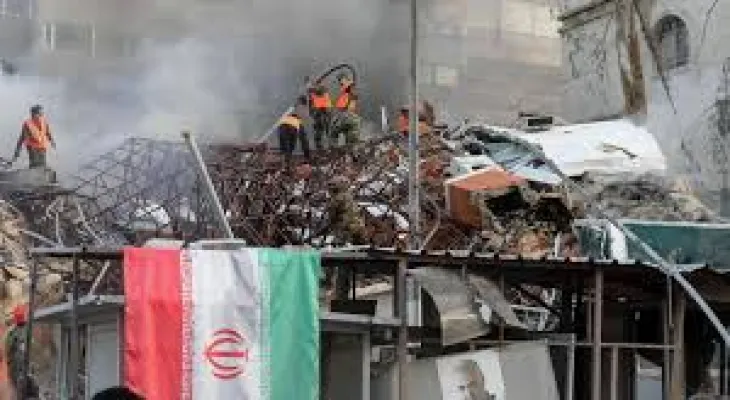Search here
Newspaper
Search here

Arab Canada News
News

Published: April 10, 2024
Canadian officials have not spoken much publicly about the condition of the Canadian embassy in Damascus, Syria, a week after an Israeli bomb or missile destroyed the adjacent Iranian embassy annex.
A source at Global Affairs Canada (GAC) told CBC News that the Canadian embassy building sustained damage during the airstrike that took place on April 1, including the destruction of at least some of its windows. Officials have not yet been able to assess the building to determine structural damage.
The explosion that destroyed the adjacent consular annex sent a strong shockwave through the foundations of nearby buildings.
Global Affairs declined to answer questions about whether the Israeli government had warned Canada in advance of the strike on the Iranian embassy annex.
The nearby Canadian embassy suspended its operations in 2012 as the Syrian civil war worsened. GAC did not mention whether Israel had checked with Canada to ensure no Canadian staff were on site when the airstrike occurred.
Canadian diplomats and other staff, including RCMP officers, have entered Syria on several occasions since the embassy's closure. It is unclear whether they used the embassy as an operational base.
A GAC source told CBC News that the embassy building remains owned by the Government of Canada.
The Canadian embassy is located two doors down from the large and ornate embassy of the Islamic Republic on Al-Farabi Street in the Mazza district, which hosts many foreign embassies. Between the two buildings was a standard consular annex used by the Iranian government.
On the night of Monday, April 1, this annex was hosting a meeting of Iranian generals and senior Revolutionary Guard officers. Independent verification of the number of casualties from the Israeli airstrike was not possible, while the Syrian Observatory for Human Rights reported that the strike killed 16 people, including two civilian passersby.
Iran’s ambassador to Syria, Hussein Akbari, claimed that the strike was carried out by Israeli F-35 aircraft that launched six missiles.
The Iranian government announced the killing of seven Revolutionary Guard members, including two generals. Some Israeli reports claimed that a Hezbollah representative was killed in the strike, and The New York Times cited an Iranian Revolutionary Guard source saying that the Palestinian Islamic Jihad movement had a representative at the meeting.
The most significant loss for Iran was the death of Brigadier General Mohammad Reza Zahedi, the external operations arm of the Revolutionary Guard’s Quds Force. Zahedi was the only Iranian member of the Lebanese Shia Hezbollah group's Shura Council and was widely considered the top Iranian military official in Syria and Lebanon.
Israel follows a policy of not claiming responsibility for attacks conducted in other countries. A spokesperson for the Israeli embassy refused to disclose whether Israel had warned Canada in advance about the airstrike.
Yiftach Greenfeld, from the Israeli embassy, told CBC News: "Israel has not taken responsibility for the strike, so I have no further comment beyond that."
Iran promised retaliation, with Yahya Rahim Safavi, senior advisor to Iran’s Supreme Leader Ayatollah Ali Khamenei, telling the Iranian Students News Agency that “the embassies of the Zionist regime are no longer safe.”
Iranian television also aired images of various ballistic missiles it claimed could strike Israel. Retaliation threats prompted Israel to cancel all military leaves and strengthen its air defenses.
Israeli officials also leaked news that their air forces were conducting drills on striking Iranian nuclear facilities.
The Vienna Convention protecting diplomatic missions prohibits host countries only from committing violence against diplomatic missions — so Israel striking an embassy in a third country is not a violation of the treaty, although it breaches international agreements.
Israel has long argued that Iranian government officials were involved in the deadly bombing of its embassy in Buenos Aires in 1992.
In December, a French consular official and his family were killed in an Israeli airstrike in Gaza on the home of another French consulate staff member in Gaza.
The French Foreign Ministry said, "The home was hit by an Israeli airstrike Wednesday evening, resulting in serious injuries to our agent and the death of about 10 others."
France condemned the bombing, which targeted a residential building.
French Foreign Minister Catherine Colonna said, "We have asked for clarification on why the house was bombed."
Comments